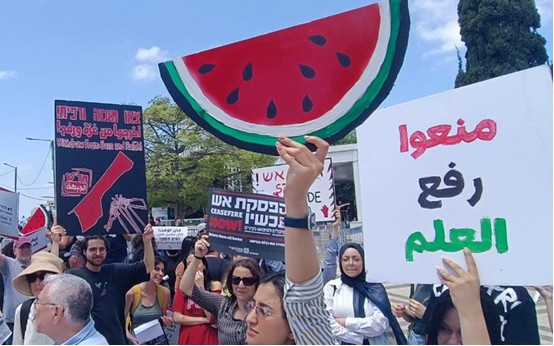Hundreds of people rallied on Wednesday, May 15, at the entrance to Tel Aviv University to mark the Nakba. Among them: students, lecturers and the Communist Party of Israel Secretary General Adel Amer, MK Ofer Cassif (Hadash) and Hadash Secretary General Amjad Shbita.
Participants at the event were prohibited from waving Palestinian flags in accordance with the conditions set by the police. Instead, many carried signs in the shape of a watermelon, which has the same colors as the flag. The Tel Aviv District Police spokesman told Haaretz that the decision to ban the Palestinian flag was taken “due to the sensitivity of the period.”

Arab and Jewish activist students, members of Hadash and the Communist Party of Israel attend a rally marking the Palestinian Nakba anniversary at the Tel Aviv University on May 15, 2024 (Photo: Zo Haderech)
Dozens of far-right counter protesters were present at the rally, with some displaying flags of the fascist organization Im Tirtzu, and placards reading “This isn’t Columbia here” and “Nakba is nonsense.”
Permission to hold the Nakba rally was only granted to Hadash students Tuesday night, after the Associations for Civil Rights in Israel (ACRI) asked the High Court of Justice to reverse police ban on the protest. This is the first time since the annual event was established 12 years ago that it is not being permitted.
The event itself went quietly, with participants holding up placards saying “No to the occupation and blockade, yes to peace”, “Ceasefire now”, “End war and occupation” and the names of Palestinian villages that were destroyed in 1948.
On Sunday, ACRI filed a petition with Israel’s High Court of Justice demanding that the police specify reasons for the decision to bar the gathering from taking place in the university campus. The organizers, who are affiliated with Hadash at the university, approached the police for a permit about a month ago. Last week, the organizers were called to a meeting with police, at which they were told that the permit would not be approved.
“In the conversation at the station, they proposed that we hold the demonstration in a closed hall or an Arab city. We tried to explain that the aim is that the ceremony be public and open,” David Margalit, the secretary of the Hadash students on campus, said. “At the end of the meeting, the officers verbally told us that they would refuse our request but so far, we haven’t received an official letter despite contacting them several times.”
Tel Aviv University said in response: “In accordance with the laws of the State of Israel, the right to protest is given to all citizens, Jewish or Arab, right or left. Our students from the Hadash club asked the police last week to hold a quiet demonstration outside the university gates, as they do every year.” Last week, Tel Aviv University’s president, Prof. Ariel Porat, approached the commander of the Tel Aviv police district, Peretz Amar, imploring him to approve the permit. “If you believe that granting a sweeping protest permit is liable to harm public safety, please consider intermediate options such as a protest permit with limitations that you find appropriate to impose on the demonstrators. A sweeping deprivation of the freedom to demonstrate is extreme, may be disproportionate and will have implications on the right to demonstrate in the future,” Porat wrote. “To the best of my knowledge, this is the first time that a request by our students to demonstrate is being refused.”
The Association for Civil Rights in Israel said the handling by the police of the permit request for this week’s Tel Aviv University event “has been characteristic of the police in recent months, which have been working to suppress protest vigils, rallies and protests organized by Arab demonstrators, by those seen as supporters of the left who oppose the war.”
On Tuesday, thousands of Arab-Palestinian marched in northern Israel to commemorate the Nakba and to demand the right of refugees to return. After gathering in the northern city of Shefa-Amr, participants marched to the site of Hawsha and Al-Qasair, Palestinian villages that were forcibly depopulated during the Nakba of 1948 and subsequently destroyed.
In addition to the ongoing deadly assault on Gaza, this year’s march took place under the oppressive weight of the far-right Israeli government. Since coming to power a year and a half ago, this government has slashed budgets for Palestinian communities; continued to neglect the spiraling problem of organized crime and violence; and ramped up house demolitions — most recently with the razing of an Arab-Bedouin village in the Negev last week in order to expand a highway.
The High Follow-Up Committee for Arab Citizens, led by former Hadash MK Muhammad Barakeh, called on the entire Arab-Palestinian public in Israel to participate in the March of Return. Many of participants hold up Palestinian flags and wear keffiyeh head scarves during the annual “March of Return,” a rare demonstration permitted to go ahead as the war in the Gaza Strip rages on. For months, the police criminalized all anti-war demonstrations. In early November, they prohibited a protest organized by the High Follow-Up Committee in Nazareth, and arrested and interrogated several of its leaders, among them Barakeh. Only recently have any demonstrations been granted permits, including the May Day and Land Day commemorations.
Related: https://maki.org.il/en/?p=31824


